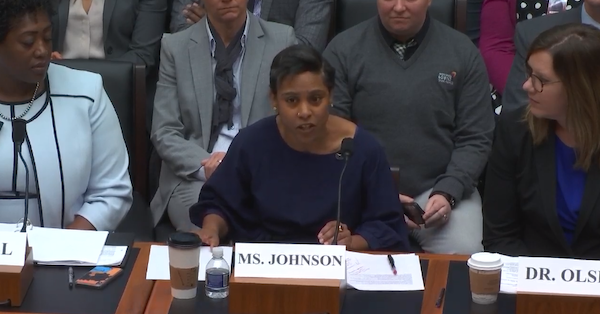On April 2, 2019, the Deputy Executive Director of the National LGBTQ Task Force Action Fund Kierra Johnson testified to the U.S. House Committee on Financial Services on Housing Discrimination and the LGBTQ Community:
“My name is Kierra Johnson, I’m the Deputy Executive Director of the National LGBTQ Task Force Action Fund. I want to thank the members of this committee for taking the time to address such an important issue.
As a bisexual person, I especially want to thank the committee for inviting a member of the LGBTQ community here today. It is rare for discussions on housing discrimination to center the experiences of LGBTQ people. But it shouldn’t be.
- Housing discrimination complaints are filed by LGBTQ people at a rate similar to race discrimination complaints filed by people of color
- And approximately one in four transgender people in the U.S. have experienced some form of housing discrimination because of their gender identity
- Courts and State and local legislators have worked to make housing protections for LGBTQ people more explicit but still protections are inconsistently applied, and enforcement is even more unpredictable.
There are real consequences when we fail in our duty to protect LGBTQ people from discrimination. For example, nearly one-third of transgender people have experienced homelessness at some point in their lives. And while LGBTQ young people make up maybe 6 or 7 percent of the general population, 40% of young people experiencing homelessness identify as LGBTQ. To be clear people end up homeless not from a lack of trying but because they are unable to find or keep housing.
So, again, as a queer person, I am appreciative to have been asked to be a part of this conversation.
As a Black, queer, mother of two, I am disappointed that it is so rare to center the experiences of LGBTQ people in conversations about housing.
When the Fair Housing Act was passed in 1968, it promised protection from discrimination in housing on the basis of race, color, religion, and national origin. There wasn’t an asterisk after those protections. It didn’t say ‘All Black people are protected – unless you’re a woman.’ It didn’t say ‘Latinx people are protected – unless you’re living with a disability.’ AND It didn’t say ‘All Muslim and Jewish people are protected – unless you’re gay.’
But in practice, people who wanted to discriminate sought out those gaps in the law and exploited them.
A landlord could say, ‘I’m not racist – I just don’t rent to unwed mothers.’
A mortgage broker could say, ‘I’m not anti-Semitic, I just think that with his disability he’s too much of a credit risk.’
Congress has worked hard to close those gaps. Since 1968, sex, disability, and familial status have been explicitly named in the FHA, so that they won’t function as gaps in the law. But there’s still work to be done.
I am a Black queer woman with two brilliant boys. When a landlord won’t call me back, or a bank won’t approve my loan, I don’t know if it’s because I’m Black, or because I went to see the apartment with my partner. I don’t know if it’s because I have two children or because I’m not a man. I don’t know. And if I try to challenge that decision, there’s a good chance I’ll fail. That landlord knows that because sexual orientation isn’t explicitly named in the law, there’s a gap he can exploit, and the chances of him experiencing any consequence from his bias drops significantly.
These are the cracks that the people you represent slip through—everyday people with dreams, families, responsibilities and a human desire to live with dignity.
There are answers to this. The Equality Act would protect LGBTQ people in housing. The Landlord Accountability Act would cover low-income people who have housing vouchers. And the Fair Chance at Housing Act would help formerly incarcerated people secure stable housing.
I call on the members of this committee to think about what it means to leave these groups of people without explicit protections. Do we not care about Black and Brown people unless they are straight? Do we not care about women unless they have never been so hopeless as to commit a criminal act to survive? Do we not care about people with disabilities unless they have enough money not to need a housing voucher? I hope not.
I thank you for the time you’ve given me today, and the time you take to fight for these protections tomorrow.”

